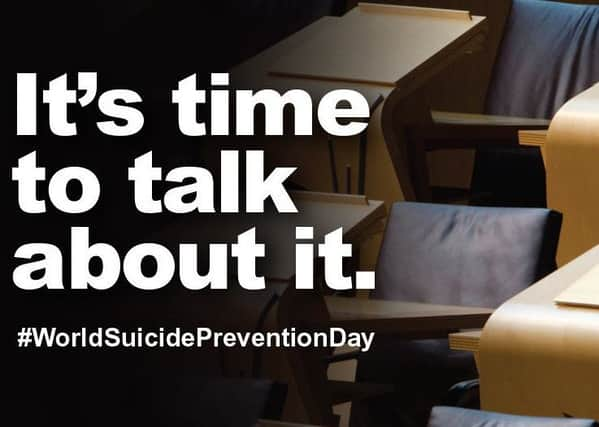Charity calls for action to tackle rising suicide rate


The Mental Health Foundation Scotland has also described as “unacceptable” a reduction in funding for suicide prevention.
Statistics from the National Records of Scotland have shown that 728 people died by suicide in 2016 – 56 more deaths compared to 2015.
Advertisement
Hide AdAdvertisement
Hide AdWith World Suicide Prevention Day on September 10, the charity has launched ‘It’s time to talk about it’, a public campaign which includes a 12-point action plan on fostering good mental health with a view to tackling Scotland’s rising suicide rate.
New Freedom of Information data obtained by the Mental Health Foundation Scotland reveals, in some cases, a significant reduction in suicide prevention investment in some of Scotland’s local authorities.
The Foundation has warned against complacency, given that the overall fall in suicides over the past decade has resulted in several local authorities scaling down investment on suicide prevention.
The charity’s recommendations include:-
· Giving teachers the right training to talk about mental health in classrooms.
Advertisement
Hide AdAdvertisement
Hide Ad· Embedding compulsory suicide prevention training for all clinical health workers, allied health professionals and pharmacists.
· Encouraging compassionate workplaces that foster good mental health and support people to stay in employment during periods of ill health.
· Implementing a national roll-out of Community Triage for people in crisis.
· Support for individuals directly impacted by suicide, particularly family and first responders to avoid “copycat suicide”.
Advertisement
Hide AdAdvertisement
Hide Ad· Greater mental health support for victims of crime and those in the justice system.
· The ring-fencing of suicide prevention funding by local authorities.
The figures have also revealed that in 2016, the suicide rate for males was more than two and half times that for females and that people living in the most deprived areas are more than three times more likely to die by suicide than people living in the least deprived areas.
Research has also shown that 70 per cent of those who died by suicide had some type of contact with healthcare services in the year prior to death.
Advertisement
Hide AdAdvertisement
Hide AdToni Giugliano, Mental Health Foundation Scotland’s public affairs manager, said: “It’s time for a national conversation about the devastating impact of suicide and what more can be done to prevent them. Whether it’s giving teachers the training to explore mental health in schools, creating compassionate workplaces or investing in crisis services, it’s clear that action is needed.
“We hope that the increase in suicides in 2016 is a one-off, but we can’t be complacent. That’s why today we are launching ‘It’s time to talk about it’. a 12-point action plan that looks at our schools, workplaces, health service, prisons and beyond.
“It’s clear that men, as well as people living in poverty are at much greater risk of suicide. That’s why we are calling on the Scottish Government, ahead of its new suicide prevention strategy, to commit to tackling the inequalities that too often are the root causes of suicide.”
Mr Giugliano also said that continued investment in suicide prevention is vital.
Advertisement
Hide AdAdvertisement
Hide AdHe continued: “Our Freedom of Information data reveals that several local authorities have significantly reduced suicide prevention funding in recent years and that is utterly unacceptable. We can’t jeopardise the excellent work of the past decade by scaling down investment. We’re calling on policy makers to avoid complacency and ring-fence funding for suicide prevention.
“A majority of people who live with mental health problems never seek professional help. This means that there is a role for all of us to identify and support people experiencing distress. For anyone worried about a friend or a loved one we would strongly advise that they visit NHS Scotland’s Choose Life website, which provides information on talking to someone. Samaritans Scotland are also available to talk 24 hours a day all year round on 116 123.”